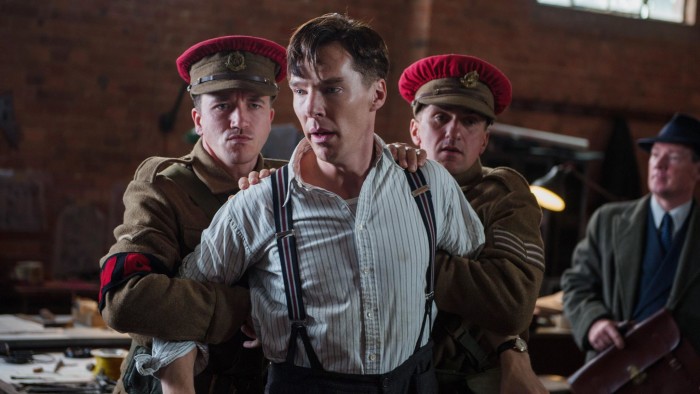The Imitation Game – film review

Simply sign up to the Life & Arts myFT Digest -- delivered directly to your inbox.
Any film about the life of pioneering British computer scientist Alan Turing, who committed suicide in 1954 as a result of his conviction for homosexuality, is always going to feel like a major document. Such a film has an obligation both to his memory and to the intelligence of the whole national conversation: public service cinema. Based on Andrew Hodges’ 1983 biography, The Imitation Game has Benedict Cumberbatch in the lead, an actor now not just a global obsession but also seemingly the personification of wish-fulfilment genius: the cerebral equivalent of a martial arts star.
However, working fiercely against him is the shamelessness of the Heritage Film Industry, indulging in a dialogue-thudding structure of pre-existing “British” movie tropes and clichés (although in fact this was written by an American, directed by a Norwegian, and at one point Leonardo DiCaprio was tipped to play Turing).
Cue an impatient establishment officer (Charles Dance, wasted and underused) and several ink-splattering “eureka” moments over tea and biscuits in prefabs at Bletchley Park. The Turing of the film is twitching and solipsistic and his secret work building the electro-mechanical Enigma code-breaking machine mostly done alone – until his colleagues in Hut 8, including a touching Keira Knightley, rally round. The best moments involve the machine itself: a sensationally gigantic black slab of clanking, vibrating mystery towards which Cumberbatch draws close, sometimes in the spirit of what seems like intimate confession, sometimes in wild frustration.
Yet this is only a part of the story. Had Turing been removed and punished for his homosexuality while at Bletchley, Britain might have lost the second world war. Acknowledging that his sexuality is a key element of the narrative means that the movie is also about the too-slow repeal of our laws prejudiced against gay people. The absolute duty to truth in relation to a subject like Turing (whose lonely death at 41 after chemical castration covers us in shame) is one of those rare things far greater than the duty to art. But there is such a gross cartooning here of everything from prejudice to genius to history (“If you speak a word of what I’m about to tell you, you will be executed for high treason!”) that we are continually suspicious of the veracity of what we are seeing. Did Churchill personally intervene to save Turing’s project? He did – and yet it smacks here of fiction.
Disraeli (1916), The Dramatic Life of Abraham Lincoln (1924), Napoleon (1927) – since the beginnings of film, the lives of great men have constituted an alluring, instructive, exhilarating genre. Yet so many are given an oversimplified, extra-sentimental push. One can’t blame Cumberbatch, whose face – with its by-now so familiar but still very peculiar top lip, like a crayon-drawn seagull – has the requisite depth and strangeness for the part. But where is the feeling of genius in the film? Where even a vague interest in a creative interpretation of its processes, as there is in Amadeus, for example, or even moments of A Beautiful Mind? Such an astonishing, crucial life as Turing’s deserves a more courageous, inventive film. Not this opportunistic, King’s Speech -like Oscar grab.

——————————————-
Letter in response to this article:
Countless inventions have come about by chance / From Charles W Turner
Comments